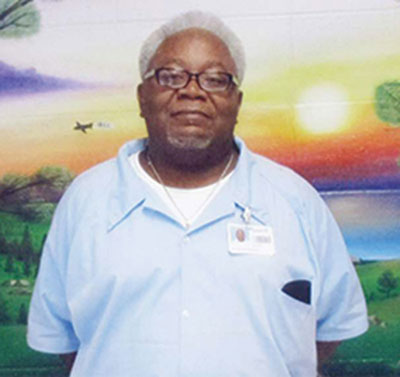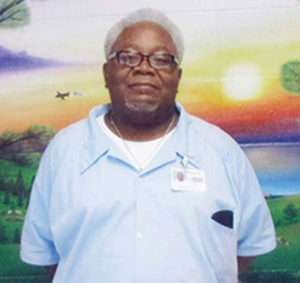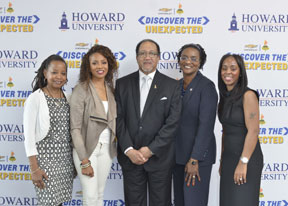

By Erick Johnson, Chicago Crusader/NNPA Member
Last June, Octavius Morris in Chicago called an attorney in New York and made a shocking confession of a crime that was committed 26 years ago. For the attorneys of Roosevelt Myles, 54, it was the call they had waited for: to speak to a woman who had been so elusive and was the key to a case that put their client behind bars for 60 years.
What Morris would tell Myles’ attorneys would give him hope and bring fresh momentum to a case that has languished in the Cook County court system for decades. While the alleged confession threatens to expose the cracks of injustices in a broken court system, it may also be the key to finally convincing a court that Myles is an innocent man who was wrongfully convicted of a crime that happened on a chilly early morning in Chicago on November 16, 1992.
In 1994, Chicago’s Octavius Morris signed this affidavit describing how she continued to say no to Chicago police as they repeatedly visited her house asking if Roosevelt Myles killed Shaharian “Tony” Brandon on November 16, 1992. Morris was the only eyewitness to the shooting and prosecutors based their case around her false testimony. The gun used in the shooting was never found and no physical evidence was presented that linked Myles to the crime.
Myles was convicted of first-degree murder after Morris testified in court that he killed Shaharian “Tony” Brandon during a robbery attempt in which Morris was present. Stuck in a revolving door of five public defenders, Myles didn’t have a chance to defend his freedom his attorneys say.
Some 26 years later, Myles remains locked up in the Illinois River Correctional Center in Canton, IL, where he’s waiting a hearing granted by an Illinois appeals court 18 years ago. On June 29, “out of a clear blue sky,” Myles’ attorney, Jennifer Bonjean, received a call from Morris on her cell phone.
Morris said Myles, known as “Blue,” did not fatally shoot Brandon.
But in court documents, Morris said she changed her confession after Chicago police officers visited her mother’s house numerous times. One of the officers is Anthony Wojcik, who has been accused of coercing confessions and lying to protect Jason Van Dyke the night he shot Laquan McDonald 16 times in 2014.
But there’s much more to this story than simply allegations of a false confession. According to newly-filed court documents, the Morris confession is just the beginning of a story that according to defense attorneys, shows that the state got away with locking up a 28-year-old man who had a strong case, but was represented by a string of five weak public defenders who did little to defend Myles’ innocence despite a bevy of evidence at their disposal, according to court documents.
In other words, the state convicted a man based on a lie.
With no defense, Myles’ attorneys say the state was able to convict their client of first-degree murder based on a “flimsy” confession of a teenager and a crack addict, who admitted her and another alleged witness’ written confessions were written by Wojcik. Prosecutors, they say, failed to present any physical evidence linking Myles to the crime.
Nearly three decades after his conviction, in 2017, Myles managed to obtain a private law firm, the Bonjean Law Group, which in court documents, says it took three months just to obtain his files from the Cook County public defender’s office. When Jennifer Bonjean and Ashley Cohen finally looked at Myles’ documents, they say they discovered a file that was in “shambles,” where nothing was done as it sat in the public defender’s office for 18 years.
Looking into Myles’ files, his attorneys discovered that not only had Morris changed her confession, but they found that their client had a very strong case that could have easily won an acquittal.
As it turned out, Myles’ lawyers said their client had three credible alibis from witnesses who were never interviewed or brought to testify during pre-trial discovery, and thus, the trial itself. Neither was Morris’ mother, who Myles’ attorneys argue, would have disputed her daughter’s confession.
In fact, Myles’ attorneys argue that had the prosecutors done their job, they would have learned that Brandon’s real killer was Shawntan Smith, Morris’ ex-boyfriend and a “dangerous gang member who had recently and repeatedly threatened the victim.”
On January 10, 1996, Myles was convicted of first-degree murder in a trial where prosecutors failed to produce any credible witnesses and physical evidence that linked him to the crime. Still, with a very weak defense, the state was able to prove that Myles beyond a reasonable doubt murdered Brandon.
Myles is currently serving a 60-year sentence in prison. Despite being granted a hearing in 2000, Myles is still waiting for that moment. He has had five public defenders. They have racked up at least 70 hearing delays before Judge Dennis Porter. Porter is accused of doing nothing to protect Myles’ constitutional rights.
Prosecutors under ousted Cook County State’s Attorney Anita Alvarez said that on November 16, 1992 at 2:45 a.m., Myles fired two shots at 16-year-old Shaharian “Tony” Brandon during a robbery attempt, which took place at Morris’ home on the West Side. Morris was with Brandon during the incident. Brandon later died.
Several blocks away from the shooting, reports say Myles left the apartment of his friend, Ronnie Bracey, to buy cigarettes from a corner store. Police arrested Myles after Morris told them that Myles was the shooter. Another eyewitness, Sandra Burch, told police that Myles fatally shot Brandon.
However, both Burch and Morris initially told police that Myles was not the shooter. But their confessions changed after several interviews with the police, who visited Morris’ house six times. During the trial, Morris said she changed her confession “because she was scared and heard rumors that she was in danger.”
According to Myles’ attorneys, Morris never told police about the rumors and that the alleged real killer, Shawantan Smith, is Morris’ ex-boyfriend and “a dangerous gang member who had recently and repeatedly threatened the victim.”
Two years before the trial, Morris gave a sworn statement to a public defender saying that Myles did not commit the shooting.
For nearly a year, Bonjean has made numerous attempts to contact Morris. The law firm even hired a private detective, who visited her home and called Morris’ cell phone; the number was listed in court documents. On one occasion, the investigator located Morris at her home and spoke to her on her cell phone at the same time, according to court documents. But Morris didn’t come to the door.
On June 28, Morris called Bonjean and confessed that Myles did not commit the shooting and that she was frustrated that prosecutors had contacted her mother. She said her confession was coerced by Wojcik, according to court documents.
Myles’ attorneys say this confession is documented in an affidavit provided by Attorney Ashley Cohen and paralegal Stacy Bagaloo after Morris failed to appear to make a sworn statement.
Wojcik is a retired 29-year veteran officer. Based on an affidavit filed with the Independent Police Review Authority—the agency that investigates controversial shootings and police misconduct—Myles says Wojcik beat him repeatedly with a flashlight and phone to force him to confess. Wojcik is also among five officers accused of lying to protect Officer Jason Van Dyke, who shot Laquan McDonald 16 times in 2014. Before he left the force, Wojcik had 41 citizen complaints, but only three were determined to require discipline. He worked under disgraced retired Chicago police detective Reynaldo Guevara, who, last June in a federal civil trial invoked his Fifth Amendment right more than 200 times when he was asked whether he coerced witnesses into making identifications, falsified police reports or pinned bogus charges on suspects.
There are also questions as to why three men, who were allegedly Myles’ alibis, were never presented as part of Myles’defense.
According to a sworn statement by Michael Hooker, his brothers, Hubert Floyd and Derrick Floyd—known as the Floyd brothers—and Burch were sitting in a car when Myles approached them asking if they had seen his friend, Ronnie Bracey, who lived in the 4700 block of West End.
In the affidavit, Hooker said Myles went into the building and Burch left the car. Hooker said he and the group heard gunshots on Washington Street. Five minutes later, Hooker said he saw Myles come of out Bracey’s house.
“I know Roosevelt Myles was not involved in the shooting on Washington Street because I saw him coming out of 4741 West End after the shots on Washington Street was fired,” Hooker said in a sworn statement.
Then there is also the testimony of state witnesses, Debra and Oliver Lenoir, who claim they saw Myles at the nearby Dragon Motorcycle Den and that he left the facility between 1 and 2 a.m. and didn’t return. Later, they told police that they saw Myles near a liquor store at the time of the shooting. Myles’ attorney says their identical handwritten statements were actually written by Wojcik,
And according to Myles’ attorneys, Debra and Oliver’s statements were never disclosed to any other officer but Wojcik. Myles’ attorney stated Debra, known as “Mellow Yellow” is a “crack-head” who knew nothing about the shooting and cooperated in exchange for “benefits from the state.”
All of this information Myles’ attorneys say was accessible and available to his public defenders, who allowed the state to convict Myles based on “scant” evidence and inconsistent testimony of a teenager and a drug addict, “who gave vague and an inconclusive account of Petitioner being in the area near the shooting- a fact he (Myles) never denied.”
Last June, Myles’ attorneys, Bonjean and Cohen, filed a motion for not only a new hearing, but a new trial in light of evidence they said should have been presented during Myles’ original trial. Bonjean says based on the evidence, Myles was denied due process and given inadequate legal representation, and thus was denied a fair trial.
In addition to their post-conviction request for a hearing, Myles’ attorneys have submitted a 349-page document with a long list of exhibits that includes investigation reports, numerous complaints against Wojcik and a sworn statement from Michael Hooker.
In reviewing the request to dismiss the case, current Cook County State’s Attorney Kim Foxx’s office says the new evidence is unsupported, without merit and has filed a motion to dismiss the case.
The next hearing before Judge Porter is September 18. It was originally scheduled for August 14–the second anniversary of Myles’ mother’s death. His father also died during his incarceration, seven months before Myles’ mother.
As the legal process drags on, Myles waits for justice that may never come.
“The delay amounts to a fundamental miscarriage of justice itself and must come to a swift, immediate end,” Bonjean said in court documents.




Be the first to comment